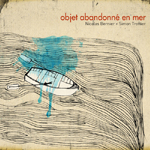I got in contact with Canadian Nicolas Bernier when I wrote a review for his recent solo-release "Ailet l'eau faille by" at No Type-Netlabel. He ordered a bunch of CDrs and after some email chatting, he told me about a special project he's been working on. Nicolas teamed up with Montreal Folk- and improvisational guitarist Simon Trottier for some kind of a concept EP dealing 'bout a stranded objet abandonne. They jammed with acoustic and electric guitar, laptop and toy piano, diverse stringed instruments, percussion and microphones. Being familiar with Nicolas' work under his own name and as part of the “Milliseconde Topographie” -series, I was very curious what this promissing duo would sound like. After weeks of careful yet extensive post-production, the outcome blow both our minds.
The “Objet abandonne en Mer”-EP consists of four tracks with the title track being sub-divided in parts one to three. Opener “Harmattan” starts with a loop of rhythmically ordered glitches. Two entangled layers of acoustic guitar burst in, the slide-guitar rises and invokes an intense feeling of being lost. Bow and synthesizer replace the slide until an acoustic guitar introduces a simple Folk-melody. “Objet abandonne en Mer” is dominated by diverse field-recordings and crackling glitches. The feeling of being lost created in the first song is altered to a vague idea of rolling with the waves. The electro-acoustic cacophony of the introduction gives rise to a calm guitar melody. For the end, a thousand small Herzog-style guitars arise and consume the spectrum 'till single tones and chords begin to establish on top.
The third track opens with a nice Blues-motive on electric guitar and Nicolas' trademark noises. The initial melody disappears in reverb while a diffuse second layer gains contour beneath the surface. Just before the 1.000 Hours of Staring-similarity become too evident, a firm and catchy guitar emerges to make you hum along. Something like the album's dramaturgic peak. “Bourrasque” afterwards is the final tune. Mainly made of Simon's wonderful guitars, the songs starts with a lot of them piled up efficiently. After all, one singular Folk-melody survives just to drown in the sound of seagulls, oceanic hissing, noise and the distance echoes of Nicolas' and Simon's voices. More than just intriguing.






